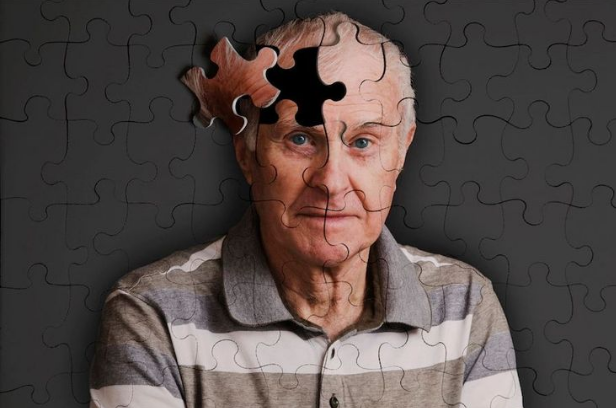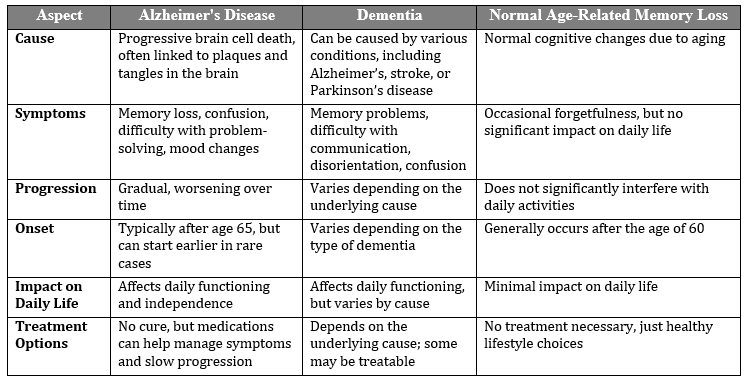Alzheimer Vs. Dementia: A Complete Explanation
Discover the key differences between Alzheimer’s and dementia, from definitions, symptoms, to management methods. Comprehensive information for a better understanding.
BODY HEALTHDEMENTIAALZHEIMERDIFFERENCE BETWEEN ALZHEIMER AND DEMENTIA
11/26/20242 min read


Advanced age is one of the contributing factors to the presence of Alzheimer's disease
The terms Alzheimer's and dementia are often used interchangeably, but there are important differences between them. Dementia is a general term for cognitive function disorders, while Alzheimer’s is a specific type of dementia. This article will help you understand the key differences, including symptoms, causes, and management methods.
What is Dementia?
Dementia is a syndrome that encompasses a range of symptoms affecting the brain’s abilities, such as memory, thinking, and communication. This condition is not a specific disease, but rather a collection of symptoms caused by various health disorders, including Alzheimer’s.
Types of Dementia
Alzheimer’s Disease: The most common type of dementia.
Vascular Dementia: Caused by impaired blood flow to the brain.
Lewy Body Dementia: Characterized by abnormal protein deposits in the brain.
Frontotemporal Dementia: Affects the brain areas controlling personality and behavior.
What is Alzheimer’s?
Alzheimer’s disease is a progressive, degenerative brain disease and the leading cause of dementia. It is marked by the accumulation of abnormal proteins, such as beta-amyloid and tau, which damage brain cells.
Main Symptoms of Alzheimer’s
Memory loss, especially about recent events.
Difficulty finding the right words when speaking.
Disorientation regarding time and place.
Mood changes, such as depression or apathy.
Key Differences Between Alzheimer’s and Dementia
Here’s a table comparing some key differences between Alzheimer’s disease and other conditions that may be confused with it:
Causes and Risk Factors
Dementia:
Stroke or brain injury.
Infections like HIV or syphilis.
Parkinson’s disease.
Alzheimer’s:
Advanced age.
Genetics (mutations in certain genes like APOE4).
Unhealthy lifestyle (lack of exercise, poor diet).
How to Manage and Treat
Dementia:
Identify the underlying cause for proper treatment.
Medications like memantine can help with specific symptoms.
Occupational therapy to improve quality of life.
Alzheimer’s:
Medications: Donepezil and rivastigmine.
Family support and creating a safe environment.
Ongoing research on immunotherapy.
FAQs About Alzheimer’s Disorders
Do all dementia patients have Alzheimer’s?
No, Alzheimer’s is just one type of dementia. Other causes include vascular dementia or Lewy body dementia.Can Alzheimer’s be prevented?
The risk of Alzheimer’s can be reduced by maintaining a healthy lifestyle, such as exercising and avoiding smoking.How is Alzheimer’s diagnosed?
Diagnosis includes cognitive tests, MRIs, and a comprehensive medical evaluation.Does dementia always occur in older adults?
No, early-onset dementia can occur in individuals under 65 years old.What is the role of genetics in Alzheimer’s?
Certain gene mutations, like APOE4, can increase a person’s risk of developing Alzheimer’s.
Although Alzheimer’s and dementia are closely related, they have fundamental differences. Alzheimer’s is the leading cause of dementia, but not all cases of dementia are caused by Alzheimer’s. By understanding these differences, you can be more informed in supporting patients and seeking appropriate care.


Table of Differences ; Alzheimer Vs. Dementia and Other Condition
